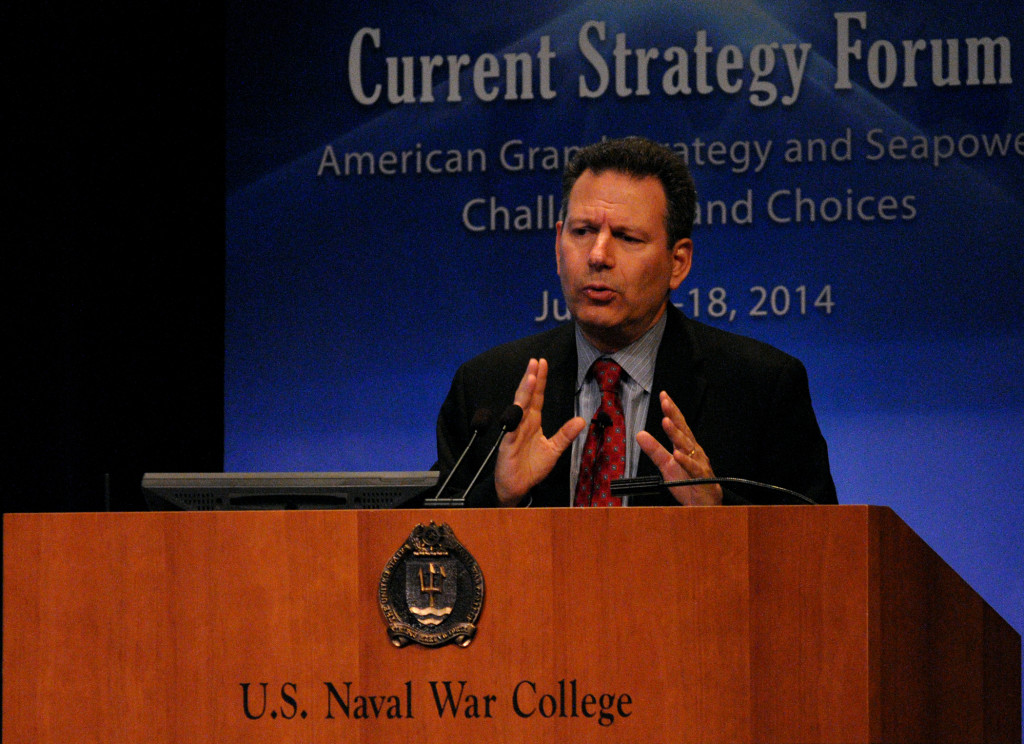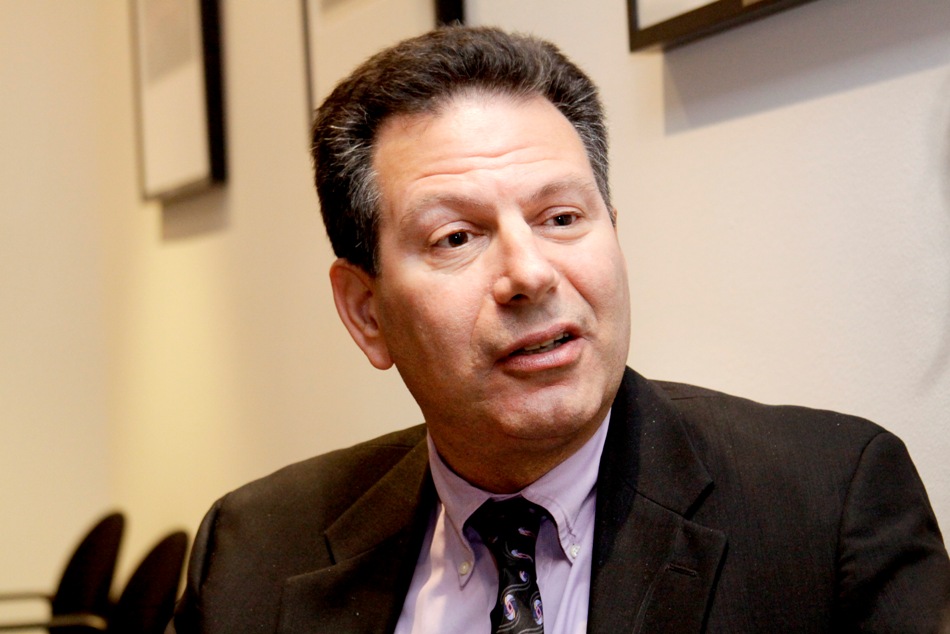
Robert D. Kaplan is the bestselling author of many books on foreign affairs including In Europe’s Shadow, Asia’s Cauldron, The Revenge of Geography, Monsoon, The Coming Anarchy, and Balkan Ghosts. His writing is eclectic and lucid; an essential voice in modern political scholarship. Kaplan is a senior fellow at the Center for a New American Security and a contributing editor at The Atlantic, where his work has appeared for three decades. His most recent book is entitled Earning the Rockies: How Geography Shapes America’s Role in the World, and is set to be published early next year.
TRANSCRIPT
LNP: Hi, my name is Luke Phillips and I am a senior correspondent at Glimpse From the Globe, USC’s student-run international affairs publication. We are joined today for this first installment of the podcast interview series by the legendary journalist, Mr. Robert D. Kaplan.
Robert Kaplan has written many, many great books on geopolitics and history and travel, and his newest book “Earning the Rockies” is coming out in 2017. Mr. Kaplan, welcome!
RDK: Thanks, it’s a pleasure to be here.
LNP: So Mr. Kaplan, in preparation for this interview, I was rereading a few chapters in “The Revenge of Geography” and “An Empire Wilderness” and I get the impression that your main argument about American geopolitics is that as we move forward into the 21st Century, America is still defined by her geography, but that the social conditions which play out on that geography are increasingly conducted in an international and multicultural context.
RDK: Yes that is true. And this is elaborated on in my new book, which is coming out in 2017, “Earning the Rockies: How Geography Shapes America’s Role in the World,” my new belief is that America is being swept up into a globalized world, like it or not. And a large section of the American population can compete with that world, and will prosper.
But a large section is still stuck in space. It cannot compete, it’s stuck in the nation-state, and the geography of the United States is, remember- we’re the largest of the great satellites around the Eurasian super-continent. So we are removed from the turmoil and chaos of Eurasia.
But at the same time, our river systems, which empty into the Mississippi and meet the great sea-lines of communication bring all of our great cities into communication with the rest of the world even without jet airplanes, simply by shipping. So that we’re connected to the world, even though we’re somewhat protected [from]it. But our middle class is less protected than ever before.
LNP: So you would argue that the trends that many people, from Ross Douthat to Joel Kotkin to Michael Lind have been seeing, with the increasing rise of a cosmopolitan upper class that shares more in common with its international counterparts than with its countrymen, is on the one side; while on the other side you have the more traditional middle-class/working-class, nationhood-oriented people in the rest of the suburban rings and in the interior of the United States.
RDK: Yes in fact I’ve been writing about that since the mid-1990s. If you look at my book “An Empire Wilderness: A Journey Across America” in the mid-1990s, if you look at several The Atlantic essays I did in the 1990s, I was writing very directly about what I call this globalized, whiskey-sipping upper middle class that’s merging into the global elite, and a lower middle and lower class that is slipping behind, staying anchored in the nation-state, so that the middle class itself is weakening, and it’s dividing up into an upper-middle and a lower-middle.
LNP: Now there are some who would argue that it is important for the maintenance of American nationhood that we strengthen that middle class and lower class as well as strengthening the institutions of the American state and the American cultural nation, in direct opposition to the kind of globally-minded coastal elites who would instead prefer a free-trade/open-borders kind of world.
Now I know that your writing is mostly descriptive rather than prescriptive, but it nonetheless lends to the notion that there may be some sort of great cultural conflict on the horizon if those divides continue to widen; what are your opinions on the future of that kind of conflict within the American system between those two broad cultures that can both lay equal claim to being “the real Americans” quote on quote?
RDK: Yes, well, it’s playing out in politics! A large part of the Trump voters are in that lower-middle, stuck-in-space, unable to compete in the globalized world, fewer manufacturing jobs in the US since the Chinese joined the world free trading system, and a lot of Hillary Clinton’s supporters are of course in that upper-middle globalized elite that have done very very well by globalization; and you see the same thing in Great Britain. A lot of people who supported Brexit were from the Midlands, from the middle part of the country, who felt that their jobs, the weight of their wages was being threatened by immigration from other EU countries- Poles, Romanians, and others. And an upper-middle elite at Oxford, Cambridge, the City of London, who have benefited enormously from Britain being in the EU, and therefore supported it.
You cannot have social peace unless you help out the people who’ve been left behind. So, a pure Darwinian system of pure free trade, pure free markets, without a social safety net, will lead to social unrest.
LNP: It seems to me that a prospective solution could be something along the lines of what the 19th Century American School economist Henry Carey, I believe, called, the “Harmony of Interests” or what the great 19th Century Prime Minister of England Benjamin Disraeli called “one-nation conservatism,” whereby the interests of different socio-economic classes, who were being affected by economic developments in different ways, even back then, whereby the interests of different social classes could be united into a broader, nationhood-oriented political program that could bring up the bottom while protecting the top at the same time.
RDK: Yeah, look, I’m not an economist. What I am is a journalist, and I travel, and I describe things. And if you travel across the United States slowly, as I’ve done for the past year for this new book that’s coming out, what you see is a lot of towns of about 20,000 or so that used to be thriving that are now dead. The stores are empty, the streets are empty, you have places in Kansas and Indiana that have a lot of low-paying jobs for Mexican immigrants, and life has been shattered for people who’ve been living there for many generations. And this is the side of the country that the elites do not see.
Now, it’s true that a number of the solutions proposed by Mr. Trump would probably make things worse. I’m not arguing in support of him. I’m just saying that the social conditions away from the great cosmopolitan cities and coastlines, are significantly to blame for the upheaval we’ve seen in this election cycle.
LNP: I think you can even see it in other places than just the interior, I mean I live in South-Central Los Angeles and the conditions around here are similar to those as I’ve read. But I want to shift the conversation towards another aspect of your thought.
So in the last chapter of The Revenge of Geography, you argued that the United States would become something like a North-South oriented, Mexico-to-Canada kind of regional uniter of Latino and Anglo cultures in the Western Hemisphere. What implications would that kind of multinational, if not union, then integration certainly, what kind of implications would that have on the American working class and middle class which is predominantly white?
RDK: The issue is not Canada. Canada is like Chile laid on its side, almost all Canadians live within a hundred miles of the U.S. border. Canada is a middle class country. Canadian entry into the U.S. does not in any way effect the social peace inside the United States. Canada is in demographic terms a small extension of the United States going northward.
Mexico is another matter. Mexico is a country with a third, a half the population of the United States, growing faster than the United States demographically, and although it’s been dynamic economically it’s still significantly poorer than the United States with a younger average population. And because it’s contiguous to the United States, Mexican immigration has a much greater effect on the United States than immigration from other parts of the world. Mexican immigrants do not have to cross a large sea to get to the United States, they just cross a land border.
So our future is increasingly intertwined with Mexico, whether we like it or not. But while the elites experience the good side of Mexican immigration, the people in the lower middle classes in other parts of the country experience the difficult parts of it.
LNP: Do you think that the program for alleviating that difficulty will include greater international integration, and do you think we’ll see a rise in anti-immigrant populism in response to that integration?
RDK: Remember, the United States has been friendly to immigrants not all of its history but during parts of its history. There’ve been decades when very few immigrants were allowed entry, there’ve been decades when many immigrants were allowed entry. It’s always been regulated over time.
I do not see unlimited immigration into the United States. But what I see is, despite the populist upheaval, the world is increasingly converging and integrated and crises are converging with each other, so that we’re facing effectively one large conflict system in ways we haven’t in the past.
LNP: It’ll be interesting to see. I know the late Robert Pastor wrote some things on the “North American Idea,” so I’m sure there’s reason to look more into that.
My final question basket, Mr. Kaplan, revolves around the question of American identity and American geography in line with what Frederick Jackson Turner, the great historian of the Progressives and the West, discussed when he was talking about the relevance of the frontier to American democracy.
In An Empire Wilderness, you discussed how as the social changes take place and as the frontier closes in ways Frederick Jackson Turner never could have known, America becomes a more cosmopolitan entity that integrates itself with the rest of the globe, which may be a positive development, yet at the expense of what you call the Homeric Age of American identity and the Homeric Age of great exploits defining what America was. You suggested there would be a disconnect between traditional military patriotism with the new global cosmopolitanism.
My question is- do you think it is possible to maintain a semblance of what we would recognize as American nationhood, and American identity, amidst this increasingly globalized world and amidst this increasingly multicultural North American continent?
RDK: Well, we’re going to have to. Because without a sense of American identity, without a sense of pride in American history, without a sense of pride in settling the temperate zone of the American continent, with all of its cruelties, nevertheless if we have no pride in that, it will be very hard for us to be active and to do good in the world.
LNP: And so it’s important to maintain some of those institutions regardless of the challenges there will be to maintain them.
RDK: Absolutely.
LNP: I suppose the follow-up question would be, how do you see the actual geography of the United States reflecting that? I know the title of your book is “Earning the Rockies,” and I wanted to ask what the logic behind that was.
RDK: The logic will be explained in the first few pages of the book. It’s primarily about how settling the thinly-soiled lands of the Great Plains and the Rockies changed the character of the American people. Up through settling the Midwest, Anglo-Saxons encountered a landscape very similar to Great Britain. It was only when they entered water-starved areas with very little rainwater, that the Anglo-Saxon race encountered a true desert. And it was that encounter that changed the American character and created it as we know it now, and that encounter involved not just individualism but communalism. It required restraint, caution, common sense, because Utah, for instance, is only 3% arable, whereas Iowa is almost 100% arable. So settling Utah required constraint and communalism and a break on individualism. I think as I’ll explain in the book, the settling of the American West provides a good guide to our foreign policy and how we should proceed with it going forward.
LNP: That’s a fascinating idea and I look forward to reading your book and reading the fleshed out arguments on how it works. And you know, in the increasingly complex world of foreign policy in the 21st Century, I think it’s going to be even more important than ever before.
Do you have any prescriptions, forecasts, or general ideas and advice for people who are going to be looking into the confluence of American geography, foreign policy, politics, and culture moving forward?
RDK: Yes. They need to do a lot of reading of authors who have now been forgotten, but who are very important. Walter Prescott Webb, Bernard Devoto, Wallace Stegner, and others. And of course I discuss all them in my new book.
LNP: Well excellent. I look forward to reviewing your book for Glimpse From the Globe! Mr. Kaplan thank you for joining me today, we appreciate it a lot!
RDK: You’re very welcome.
A complete list of Robert D. Kaplan’s books and essays can be found here.
The views expressed by the author do not necessarily reflect those of the Glimpse from the Globe staff, editors or governors.








